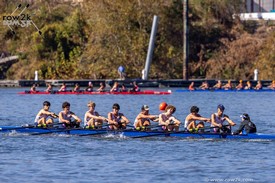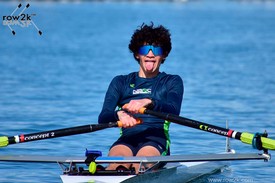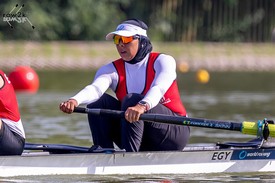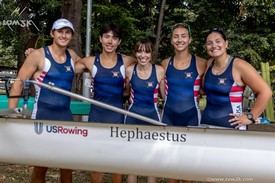Bucknell's Victoria Kielty Part II
Victoria Kielty

row2k kicks off our 2013 Spring Collegiate preview with the story of Australian Victoria Kielty of Bucknell. Part I of her story is about how she got her start in rowing in Australia, found her way to Bucknell, and ultimately fractured three vertebrae in her neck during her freshmen year. Part II focuses on how she made her recovery and is back rowing for the Bison.
HOW I RETURNED TO ROWING
The first few words out of my mouth when I woke up from surgery were a mumbled "Daddy, will you be my Valentine?" and, after a slight pause "Can I still row?" The first was clearly a product of the industrial strength painkillers and a woefully single relationship status, but the second was a genuine concern.
The sport had become a part of me, there was no way I wasn't going to continue my commitment to it. When you put your body through what a sport like rowing demands of it, it becomes next to impossible to live without. You become a masochist, a seeker of pain and discomfort. Anything less than a savage burning unpleasantness is not enough, and so you go for more. You look for your limit, and when you find it, you stop because it is physically impossible to surpass. It is your limit. Your next task then is to find a way to break it, to make a new limit. And when you do, you set out to break that too. You develop a newfound respect for yourself and the people around you who also commit to the endeavor.
After surgery I still could not feel parts of my left arm or leg. I don't know how I was convincing myself, but I was still reasoning and figuring out ways I would be back at practice within the next couple of weeks. It was only when the surgeon told me I would have to work on "...standing and walking first" that I knew my season was well and truly finished. Recovery is a humbling process. As someone who is used to being fit, strong and able, feeling the way I did during my recovery distressed me.
I once took pride in my strong, healthy body. Now I was left with little more than a shell. My angel of a mum, Susanna, fed me. My younger sister by three years had to bathe me. The most basic of human actions were things I could no longer do. The first time I stood up and walked, I felt so vulnerable and humiliated that I ordered my own father to turn his back and look out of the window while I clung to the nurse for support. He wanted to help me, which was all he wanted to do.
I felt awful for being so ungrateful and abrasive towards him; he had missed his flight overseas, slept two nights in a plastic hospital waiting room chair, and every other waking hour was at my side, but I could not let him see me like this. I felt pathetic, my steps were barely a few inches long and yet it took so much effort I could barely see.
For the next twelve weeks, I could only sleep on my back or on my left side, and turning over took at least four or five minutes. I would hold the chin support on the brace while I slept, and I still hold my chin in the exact same place when I sleep now. I was a nightmare patient. I refused help at any opportunity and would constantly overshoot my capacity for activity.
My left side was sluggish and it would take a while before a lot of this subsided. I was a shadow of myself by the time I returned to school, all semblance of muscle mass or athletic physique had melted off my body. I was far too thin. I had managed to negotiate leaving home two weeks early by insisting to both my parents and my surgeon that 1) I would be careful to the point of obsession about everything from steps to crowded places to toilet seats and 2) that I was 99% pain free and therefore not in need of any Oxy painkillers.
The second condition was a bit of a fabrication, but I was desperate to see my friends and my teammates. I would figure out a way to deal with the pain. Ironically enough, my medicine turned out to be watching the girl’s race. The bus rides to and from spring races were painful and uncomfortable, but I traveled with the team to every event I was allowed, neck brace and all. When I made my intentions to return to the team absolutely clear, people would look at me with incredulity, proceed to tell me I was insane and ask "Why?" There were no steps of realization or decision making. I was injured; I had been injured before and I had made it back. I was going to make it back. No questions.
I soon realized that the surgeon was not exaggerating when he stated I would be working from scratch in order to get my body back to full and working order. Things were thrown into harsh perspective the first day I was able to get out of a chair by myself. Here I was fantasizing about being fit and healthy by August and it was February and I could barely stand alone. "Little by little" soon became a mantra of mine. I would insist on doing everything by myself, from reaching for a glass to walking to class. I needed to instill a sense of independence and confidence in myself that, as touched as I was by my friends' attentiveness, was not going to happen with their help.
Speaking of help, I was not being guided by any medical instruction; I received no physical therapy. I was doing this blind, working off feeling the difference between things I could and could not do. Often times I learned the hard way. If I went too hard or too long on any given day, I would be left bedridden for at least the rest of that day and night. Nerve pain plagued my every movement. This type of pain is indescribable. It can only be understood by those who have experienced it. It is still a daily occurrence for me, sometimes taking a little more than thirty minutes post-practice to subside; sometimes it pervades well into the next day.
I still have no sensation from the bottom of my shoulder blades to the base of my neck, and in some pads of my fingers on my left hand. It became a simple equation as I fell into a more regular training routine: Keep going, and do not, under any circumstances give up. Coach will say to us before a test: "No one gets off the erg, no one stops, and no one gives up. You owe the sixty other women in this room at least that much."
I set myself weekly strength and fitness goals, and kept a diary. I didn't want to burden my family and friends with any more than I already had, so anything I felt, I wrote down. When summer ended finally and I was back at school, my primary barrier was not my physical condition but my confidence.
I had rebuilt a relatively healthy body with a good aerobic base by the time we had returned, but my faith was shattered. I had no self-confidence. I still couldn't pick up a heavy schoolbag without wincing; fall training in singles and with weights seemed like an impossibility. A spot on varsity seemed so far out of my reach that even to consider it was ludicrous.
The turning point came when the team underwent testing for the Head of The Charles. A 20 minute piece, covering roughly 5k was the task. The fastest 9 scores would go to Boston in an open weight eight with one spare. I wasn't even going to do the test until a teammate said to me, "Seriously, Kielty, what have you got to lose?" I realized how large a disservice I was doing myself and my team by not even trying, and so I got on the machine and went.
I finished in the top 8 places, and I had done so even faster than I had at the same time the previous year. I was back. Any athlete knows the magnitude of the sacrifice it is to cry in front of a coach. Mine looked at me smiling and asked, "Are these happy tears or sad tears?" Coach Dan Wolleben knew exactly what kind of tears they were. I was hurting, but I was happy; ecstatic.
The year continued and I completed the rest of fall, survived winter erg season and raced in the spring in the Second Varsity Eight, helping the team to its seventh Patriot League Championship and first ever Dad Vail overall points win. The Women's Henley Regatta at the beginning of the summer was the cherry on top; an opportunity I would have never thought possible.
It was the perfect end to a wholly imperfect past year and a half. The scar still remains on the back of my neck; a constant reminder of a distant brush with danger. I still lift my schoolbag with zero upper body stoop and look to cross the road with my entire torso. I think I will always wear that neck brace.
The memories will invade my thoughts from time to time along with the tingling in my left hand and leg, and it probably will for years to come. That injury is now a part of me physically and emotionally, and it gave me a perspective on life that has changed me entirely - for the better. It is through experiences like this that one realizes how much more they are capable of. My family, teammates and sport made sure I kept moving forward and never looked back. The beauty of this sport, however, is that you are constantly moving forward, but always looking back at what you have accomplished.
If you enjoy and rely on row2k, we need your help to be able to keep doing all this. Though row2k sometimes looks like a big, outside-funded operation, it mainly runs on enthusiasm and grit. Help us keep it coming, thank you! Learn more.
Comments | Log in to comment |
- Bont Rowing
- Calm Waters Rowing
- Concept 2
- Craftsbury Sculling
- The Crew Classic
- CrewLAB
- Croker
- Durham Boat Co.
- Empacher
- Faster Masters
- Filippi
- Fluidesign
- h2row.net
- HUDSON
- Live2Row Studios
- Nielsen-Kellerman
- Oak Ridge RA
- Peinert Boat Works
- Pocock Racing Shells
- Race1 USA
- RowKraft
- Rubini Jewelers
- Vespoli USA
- WinTech Racing
- Bont Rowing
- Calm Waters Rowing
- Concept 2
- Craftsbury Sculling
- The Crew Classic
- CrewLAB
- Croker
- Durham Boat Co.
- Empacher
- Faster Masters
- Filippi
- Fluidesign
- h2row.net
- HUDSON
- Live2Row Studios
- Nielsen-Kellerman
- Oak Ridge RA
- Peinert Boat Works
- Pocock Racing Shells
- Race1 USA
- RowKraft
- Rubini Jewelers
- Vespoli USA
- WinTech Racing


















02/12/2013 3:04:30 PM
02/11/2013 1:04:19 PM